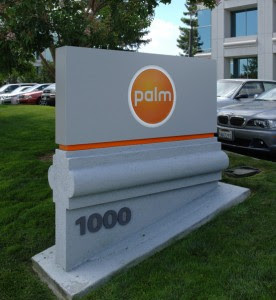HP to acquire Palm for $1.2bn
Palm, the company that invented the PDA but has struggled to stay relevant in recent years, will be acquired by computing giant Hewlett-Packard.
The companies announced after Wall Street trading ended, that HP will buy Palm for $1.2 billion. The $5.70 per share offer amounts to 23 percent above Palm's closing price. The deal has already been approved by both companies' boards of directors and is expected to close by the end of July.
For Palm, it's a quiet end to what was once one of the most dynamic companies in technology. Spun out of the computer networking maker 3Com 10 years ago, Palm once held more than 70 percent of the then nascent handheld computing market. But several years of management struggles, product misfires such as the disappointing Foleo mobile computing device, and tough competition from companies ranging from Microsoft and Research in Motion to Apple and Google, turned the innovator into an also-ran.
In 2007, a high-profile, $460 million investment from the private-equity firm Elevation Partners and the unveiling of the Foleo sparked hopes of a revival that never occurred. Elevation Partners is expected to make a paltry $25 million profit on its investment.
With HP, Palm's still well-regarded technology (particularly its new WebOS mobile operating system) finds an owner with both deep pockets and familiarity with the inner workings of Palm. Todd Bradley, executive vice president of HP's Personal Systems Group, was CEO of Palm from 2002 through 2005.
"Palm's innovative operating system provides an ideal platform to expand HP's mobility strategy and create a unique HP experience spanning multiple mobile connected devices," Bradley said in a statement. "And Palm possesses significant IP assets and has a highly skilled team."
Early indications are that HP is interested in Palm's Web OS and array of mobile products, ranging from tablets and Netbooks to phones. Palm also brings a healthy patent portfolio, which has become increasingly important as both Microsoft and Apple have in recent months sought to enforce their own mobile technology patents.
In buying Palm, "HP acquires a strong operating system and an application store with over 2,000 apps," Bradley added. In a conference call, he specifically highlighted the multitasking capabilities of WebOS and the valuable intellectual-property portfolio. (Palm has 1,650 patents, according to HP notes.)
"We're thrilled by HP's vote of confidence in Palm's technological leadership, which delivered Palm WebOS and iconic products such as the Palm Pre," said Jon Rubinstein, Palm's CEO, said in a statement. "HP's longstanding culture of innovation, scale, and global operating resources make it the perfect partner to rapidly accelerate the growth of WebOS."
Rumors began to fly that Palm was headed for a sale after its most recent dismal quarterly earnings report showed that the company had yet to gain any real momentum for its Palm Pre and Palm Pixi phones. Palm had hoped that the new hardware, along with its new WebOS mobile operating system, would help turn the company around.
Although Lenovo and HTC emerged early on as potential suitors, neither appeared as in need of a mobile strategy as HP. HP currently offers one basic messaging phone, but it's packaged mostly with laptops and workstations that HP sells to large corporate clients. Most of HP's rivals in the PC world have developed smartphones intended to compete with Nokia and Apple. Snapping up Palm would give HP a more substantial presence in the market.
On the conference call with investors, Bradley called acquiring Palm "a transformational deal" for the mobile industry. He noted that the smartphone market alone is worth $100 billion and is growing 20 percent annually.





